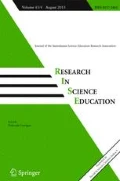Abstract
The period since the 1960s has seen dramatic change in the nature and practice of science, science education and secondary school education itself. This paper examines changes in the Science for All movement, setting these changes in the context of the societal shift towards market liberalism and the advancement of a new style of individualism. We argue that the climate of today requires a re-focusing of the priorities of secondary school science education, with a new emphasis on what Science for All implies for the education of those who will go on to be our scientific elite.
Similar content being viewed by others
References
Aikenhead, G. (1996). Science education: Border crossing into the subculture of science [electronic version]. Studies in Science Education, 27, 1–52.
Aikenhead, G. (2001). Students’ ease in crossing cultural borders into school science [electronic version]. Science Education, 85, 180–188.
Atkin, J. M., & Helms, J. (1992). Testing in mathematics and science – For everyone [electronic version]. Vancouver, Canada: TIMMS International Coordinating Center.
Blades, D. W. (1994). Procedures of power and possibilities for change in science education curriculum discourse. Edmonton, Alberta: University of Edmonton.
Board of Studies. (1995). The curriculum and standards framework for science. Carlton, Victoria: Board of Studies.
Chapman, B. (1991). The overselling of science education in the eighties. School Science Review, 72(260), 4–63.
Cross, R. T., & Fensham, P. J. (Eds.). (2000). Science and the citizen: For educators and the public. Fitzroy, Victoria: Melbourne Studies in Education.
Fensham, P. J. (1985). Science for all: A reflective essay. Journal of Curriculum Studies, 10, 346–356.
Fensham, P. J. (1992). Science and technology. In P. W. Jackson (Ed.), Handbook of research on curriculum (pp. 789–829). New York: Macmillan.
Fensham, P. J. (1998). The politics of legitimating and marginalizing companion meanings: Three Australian case stories. In D. A. Roberts & L. Ostman (Eds.), Problems of meaning in science curriculum (pp. 178–192). New York: Teachers College Press.
Fensham, P. J. (2002). Time to change drivers for scientific literacy. Canadian Journal of Science, Mathematics and Technology Education, 2(1), 9–24.
Fensham, P. J. (2005). Literacy, scientific. In K. Kempf-Leonard (Ed.), Encyclopedia of social measurement Vol. 2 (pp. 541–547). Oxford, UK: Elsevier Academic Press.
Hart, C. (1995). Access and the quality of learning: The story of a curriculum document for school physics. Clayton, Victoria: Unpublished Ph. D., Monash University.
Hart, C. (2001). Examining relations of power in a process of curriculum change: The case of VCE Physics. Research in Science Education, 31, 525–551.
Hayek, F. A. (1978). New studies in philosophy, politics, economics and the history of ideas. London: Routledge.
Hogben, L. T. (1938). Science for the citizen : A self-educator based on the social background on scientific discovery. London: Allen & Unwin.
Jegede, O. J., & Aikenhead, G. (1999). Transcending cultural borders: Implications for science teaching [electronic version]. Journal for Science & Technology Education, 17, 45–66.
Jenkins, E. W. (1997). Towards a functional public understanding of science. In R. Levinson & J. Thomas (Eds.), Science today: Problem or crisis? (pp. 137–150). New York: Routledge.
Layton, D., Jenkins, E., Macgill, S., & Davey, A. (1993). Inarticulate Science? Perspectives on the public understanding of science and some implications for science education. Nafferton, Driffield: Studies in Education Ltd.
Malcolm, C. K. (2003). Science for all: Learner-centred science. In R. T. Cross (Ed.) A vision for science education. London: Routledge.
Malcolm, C. K., Cole, J., Hogendoorn, B., O’Keeffe, D., & Reid, I. (1987). The science framework P-10: Science for every student: Curriculum Branch. Victoria, Australia: Ministry of Education.
Marginson, S. (1997). Educating Australia : Government, economy and citizen since 1960. Cambridge, UK: Cambridge University Press.
Pateman, C. (1979). The problem of political obligation. New York: Wiley.
Saul, J. R. (1997). The unconscious civilization. Ringwood, Victoria: Penguin Books Australia.
Smith, D. (2006). Scientists are also citizens: Science curriculum from the perspective of the new contractualism. Unpublished Ed D thesis, Monash University, Melbourne, Victoria.
Snow, C. P. (1993). The two cultures. London: Cambridge University Press.
Solomon, J. (1997). School science and the future of scientific culture. In R. Levinson & J. Thomas (Eds.), Science today: Problem or crisis? (pp. 151–162). New York: Routledge.
Solomon, J. (2002). Changes to science education: Where next? Canadian Journal of Science, Mathematics and Technology Education, 2(1), 25–30.
The Royal Society. (1985). The public understanding of science. London: The Royal Society.
UNESCO. (1983). Science for all. Bangkok, Thailand: UNESCO Regional Office for Education in Asia and the Pacific.
Wellington, J. (2001). What is science education for? Canadian Journal of Science, Mathematics and Technology Education [electronic version}, 1(1), 23–38.
Yeatman, A. (1995). Justice and the sovereign self. In M. Wilson & A. Yeatman (Eds.), Justice and identity: Antipodean practices (pp. 195–211). St. Leonards: Allen & Unwin.
Yeatman, A. (1997). Contract, status and personhood. In G. Davis, B. Sullivan, & A. Yeatman (Eds.), The new contractualism? (pp. 39–56). South Melbourne: Macmillan Education Australia.
Yeatman, A. (1998a, November 1998). Democratic theory and the subject of citizenship. Retrieved 11April, 2003, from http://www.gu.edu.au/centre/cmp/Yeatman.html
Yeatman, A. (1998b). Interpreting contemporary contractualism. In M. Dean, & B. Hindess (Eds.) Governing Australia: Studies in contemporary rationalities of government (pp. 227–241). Cambridge, UK: Cambridge University Press.
Yeatman, A. (2000). The politics of postpatrimonial governance. In T. Seddon & L. Angus (Eds.), Beyond nostalgia: Reshaping Australian education (pp. 170–185). Melbourne, Victoria: The Australian Council for Educational Research.
Ziman, J. (1980). Teaching and learning about science and society. Cambridge, UK: Cambridge University Press.
Author information
Authors and Affiliations
Corresponding author
Rights and permissions
About this article
Cite this article
Smith, D.V., Gunstone, R.F. Science Curriculum in the Market Liberal Society of the Twenty-first Century: ‘Re-visioning’ the Idea of Science for All. Res Sci Educ 39, 1–16 (2009). https://doi.org/10.1007/s11165-007-9069-2
Received:
Accepted:
Published:
Issue Date:
DOI: https://doi.org/10.1007/s11165-007-9069-2




